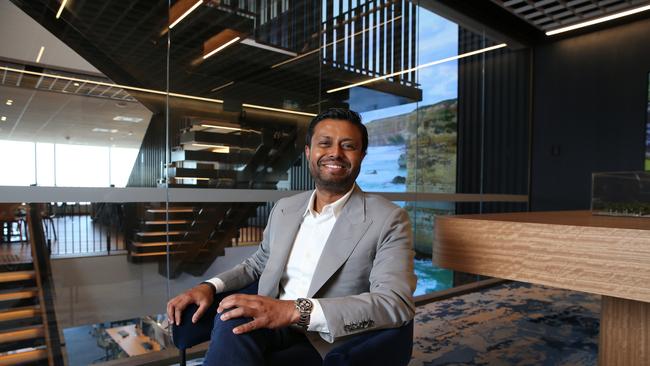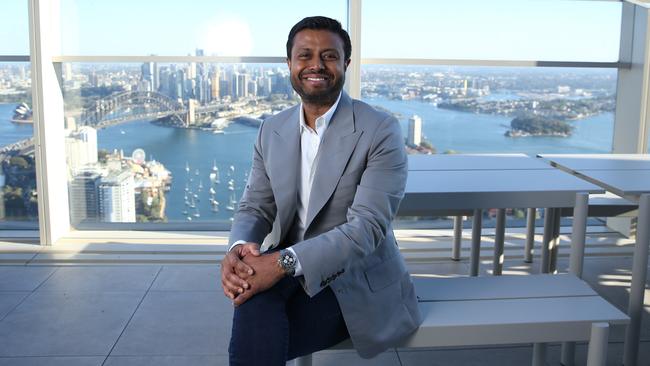Khuda sitting pretty as Bain says data centres set to become $1.4 trillion business
Bain believes the AI hardware and software market will become a $US1 trillion industry within three years, placing Robin Khuda’s goal of turning Airtrunk into a $100bn business well within reach.

AirTrunk founder Robin Khuda’s ambition of hoisting the data centre operator into a $100bn colossus is within reach after one of the world’s top management consulting firms revealed how the artificial intelligence boom will propel the dizzying valuation, with the entire sector expected to become worth more than $1.4 trillion.
Bain & Company says the market for data centres and other artificial intelligence-related hardware and software is set to soar 40 to 55 per cent each year – up to $US990bn ($1.45 trillion)– by 2027.
Data centres house the graphics processing units needed to power artificial intelligence. Without them large scale language models such as OpenAI’s ChatGPT would not exist.
In its latest global technology report, Bain said AI will spur growth in data centres from 50 to 200 megawatts a facility to more than gigawatt. This means that if a data centre costs $US1bn to $US4bn today, it will be worth up to $US25bn five years from now, Bain says.
The report comes after US private equity behemoth Blackstone took over Airtrunk – which operates 11 data centres in Australia and Asia – for $24bn.
This was more than eight times the valuation when Macquarie Asset Management and PSP Investments bought into the business in 2020, and Mr Khuda says his goal to turn it into a $100bn business was realistic, citing AI frenzy.
“If you look at the growth, it’s really four or five customers – it’s Microsoft, it’s Google, it’s Amazon, it’s Oracle. And if you’re not doing business with these customers, your business model doesn’t exist. That’s the reality,” Mr Khuda told The Australian.
“Between them, they’re looking to deploy $US200bn in new investment in cloud infrastructure just this year. If you extrapolate the next four or five years, there’s a $1 trillion investment. This company (AirTrunk) is going to support their growth.”

David Crawford, chairman of Bain’s global technology practice, said generative or conversational AI – the ability to perform a variety of automated tasks via basic verbal prompts – was the “prime mover of the current wave of change”.
The Australian government expects that AI will inject up to $600bn – or quarter of the nation’s current gross domestic product – into the economy by the end of the decade.
“Companies are moving beyond the experimentation phase and are beginning to scale generative AI across the enterprise. As they do, CIOs (chief information officers) will need to maintain production-grade AI solutions that will enable companies to adapt to a landscape that is quickly shifting,” Mr Crawford said.
“Essentially, they need to adopt an ‘AI everywhere’ approach.”
Bain believes the AI hardware and software market will become a $US1 trillion industry within three years based on three key areas: bigger and more data centres, enterprise and sovereign initiatives, and enhanced software capabilities.
Bain said “just as the pandemic created a surge in PC demand, surging demand for AI computing power will strain supply chains for data centre chips, personal computers, and
smartphones.
“These trends, when paired with geopolitical tensions, could trigger the next shortage
of semiconductors,” Bain said in its report.
“If data centre demand for current-generation GPUs were to double by 2026, not only would suppliers of key components need to increase their output, but makers of chip packaging components would need to nearly triple their production capacity to keep up with demand.”
Anne Hoecker, head of Bain’s global technology practice, said the push for more “sovereign AI” would also spur growth.
“Establishing successful sovereign AI ecosystems will be time-consuming and incredibly Expensive,” Ms Hoecker said.
“While less complex in some ways than building semiconductor fans, these projects require more than securing local subsidies. Hyperscalers and other big tech firms may continue to invest in localised AI operations that will ensure significant competitive advantages.”
In Australia, Amazon is investing $13.2bn on its local cloud infrastructure in the next three years across the eastern seaboard. Microsoft, meanwhile, is spending $5bn in its computing capacity and capability in Australia to help the nation “seize the AI era”.
For enterprises, Roy Singh, head of Bain’s advanced analytics practice, said AI could deliver efficiency gains of 30 per cent or more and fuel demand. The Australian’s CEO this year revealed many executives considered AI as one of the main levers to lift flatlining productivity.
Bain’s research shows that persistent regulatory obstacles have prompted tech companies to shift their merger and acquisition activity away from deals intended to capture scale and toward deals intended to access to new capabilities, products, or markets — what Bain calls “scope deals.”
From 2015 to 2018, the percentage of tech industry scope deals increased from 50 to 80 per cent, holding steady ever since, Bain said.
“The most valuable technology companies have shown remarkable resilience, holding spots at the top for many years and expanding their share of market value,” Mr Crawford said.
“Their success relies on their ability to identify disruptive trends and successfully scale and commercialise them, creating ‘winner takes most’ dynamics. For this decade, whoever masters the AI disruption will win big.”




To join the conversation, please log in. Don't have an account? Register
Join the conversation, you are commenting as Logout